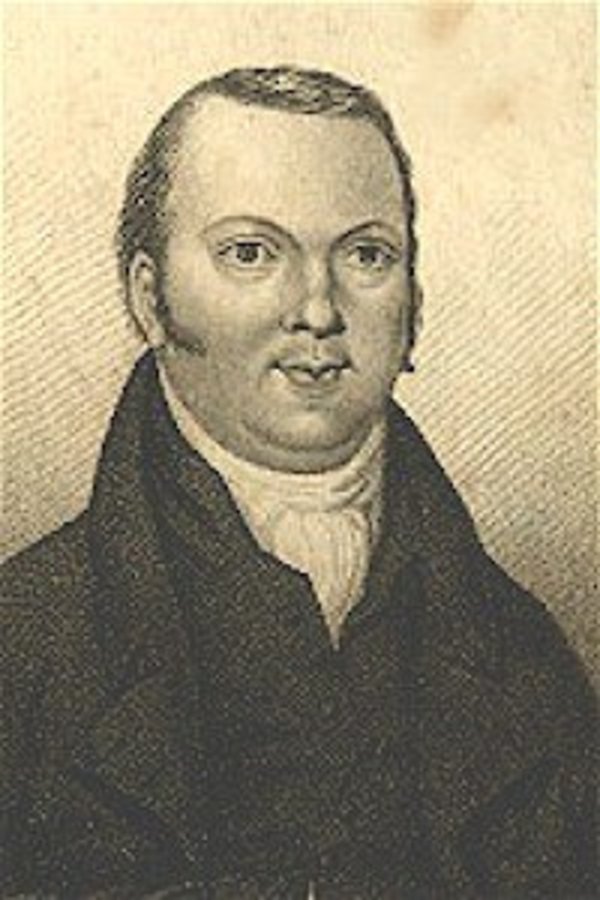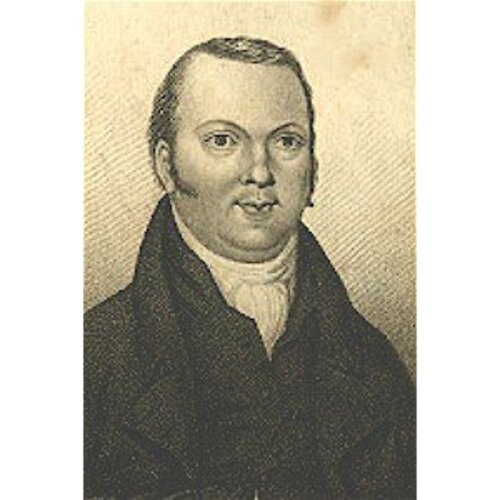
Source: Link
MARSDEN, JOSHUA, Wesleyan Methodist minister and author; b. 21 Dec. 1777 in Warrington (Cheshire), England; m. 1804 Mary Seabury in Halifax, and they had at least eight children, five of whom died in infancy; d. 11 Aug. 1837 in Hoxton (London).
Joshua Marsden was the offspring of a “respectable” and prosperous family which was reduced to modest circumstances by their father’s feckless conduct. As a result he received only a common-school education. Subsequently, he must have read widely, for his published writings are literate and scholarly. In common with many others who became evangelical preachers, he was convinced, in retrospect, that he had been an exceptionally dissolute youth, who fought with other boys, deceived his parents, was “shockingly disobedient” to his mother, played cards, danced, “got intoxicated with spirituous liquors,” and “was proficient in singing profane songs.” On occasion, however, he “would weep” over his “own wickedness,” and conclude that his “heart had in it the seeds of universal sin.”
In 1796 Marsden enlisted in the navy, partly to escape the religious entreaties and reproofs of his mother. In this “shocking seminary for vice” he witnessed “profaneness in all its diabolical characters.” Fortunately, perhaps, his ship was wrecked in December 1796 off Alderney. Returning penniless to England and fearful of the press-gangs, he joined the crew of a merchant ship. Once again he narrowly escaped death, and when the ship docked he stole away and returned home, fully cured of his interest in life on the sea. Having taken refuge in the country to escape the attention of the press-gangs, he was invited to Methodist services. The sermons jarred his conscience, but as yet “the idea of true piety in its self-denying and pleasure-hating austerity was by no means pleasing” to him. Frequently beset with fear that he was damned, tempted by his corrupt nature, comforted by John Wesley’s sermon on justification by faith, he sometimes rolled on the floor “in an agony of distress.” On Whit Sunday 1798, inspired by the preaching of George Marsden, he saw “the dark clouds of unbelief” vanish from his mind, and he “felt power to lay hold on Christ by faith.” “God’s love became the ruling principle, God’s word the standard, and his glory the end of [his] actions.”
As a new convert with “an ardent love for souls,” Marsden was persuaded to preach, and he was soon enrolled as a local preacher on the Bolton circuit of the British Methodist Conference. At this point, the Methodist connection, animated by the zeal of the Reverend Thomas Coke, was beginning to establish overseas missions, and Marsden decided to become an itinerant and a missionary. Thus when William Black* came to England in 1799 seeking ministerial recruits to replace the preachers from the American Methodist Episcopal Church who had helped him to build the Methodist societies in the Maritime provinces of British North America, Marsden offered to become a missionary to Nova Scotia. At the conference session of 1800, Marsden, William Bennett*, and two others were appointed to work with Black under Coke’s general direction. They arrived in Halifax on 4 October, and Marsden was stationed on the Cumberland circuit, the area in which Black had begun his mission to Nova Scotia.
Marsden remained on the Cumberland circuit until 1802 and was stationed subsequently at Annapolis Royal, Halifax, Liverpool, and Saint John, N.B. In June 1802 he was ordained by Bishop Francis Asbury at the conference held in New York, and in 1804 he was admitted to full connection in the British conference. Four years later the indefatigable Coke prevailed on Marsden to take an appointment in Bermuda, an inhospitable colony which had imprisoned its first Methodist missionary. He arrived in Bermuda in early May 1808, having again narrowly escaped shipwreck, feeling “pensive and dejected . . . the only consolation I had was in God and my bible.”
Once more Providence proved to be on Marsden’s side. In the slavery-dominated Bermudian society he affirmed by example his belief that the blacks were human beings, supervised the building of a chapel in which integrated services were held, opened a Sunday school in which blacks learned to read, and managed to quell the opposition of the government and the white community. When he came to Bermuda he was considered “an imposter, an enthusiast, or something worse”; when he left in 1812, there were 136 members in the Methodist society.
Marsden’s arrival in New York coincided with the outbreak of the War of 1812. Unable to go overland with his family to British North America or to sail to England, he was interned, in effect, in the United States. Asbury, however, gave him a temporary circuit appointment under the supervision of Freeborn Garrettson*, who earlier had helped to found the Methodist community in the Maritime provinces. In contrast to many of his countrymen, Marsden admired the United States, a country with “scarcely any relics of that once overgrown superstition, popery. In the soil of true freedom, such a baneful moral nightshade, must always be stunted for want of moisture.” He participated in several camp meetings, “those stupendous means of grace,” where he was “carried along as by the force of a delightful torrent.” The experience led him to conclude that God had put “his broad signet upon these ordinances of the forest world.”
On 23 Oct. 1814 Marsden sailed at last for England. He never left the soil of his birth again. He was stationed on various circuits in England, beginning with Plymouth Dock (Plymouth) in 1815. In 1836, in failing health, he became a supernumerary on the First London circuit. Marsden preached for the last time on 30 July 1837 in the famous City Road chapel on Isaiah 40: 5–8, stressing the importance of early dedication to God.
Joshua Marsden was not an outstanding preacher and he never attained prominence in the conference. Although he was evidently esteemed in the circuits on which he served and earned the respect of Asbury, he was not a charismatic figure. Unlike Black and Garrettson, he did not spark a series of revivals; rather he described his role as
A rural bishop, he will often preach,
Beneath the spreading oak or towering beech;
In sylvan scenes, proclaim the saving word,
The wood his chapel, skies his sounding board;
Or to each log-hut, in the forest maze,
This woodland priest the light of life conveys. . . .
Marsden was friendly with socially prominent men such as Lieutenant-Colonel Samuel Vetch Bayard and Simeon Perkins*; and he galvanized the Methodists of Saint John, many of whom were poor or indifferent, to construct a new chapel, in whose building he took an active part. To the Methodists of Nova Scotia and New Brunswick he was an exemplar of a simple, unadorned Methodism, in which the essential identity of the English connection and the societies in British North America, and of English and British North American culture, was never questioned.
Unlike many of his brethren, Marsden was a prolific writer. His autobiography, Grace displayed, his Narrative of a mission, and his numerous poems have few literary pretensions, but they provide fascinating insights into his daily routine, his moods, and his inner spiritual life.
Whenever possible, Marsden “divided the day into regular parts,” rising habitually at four each morning. The hours from four until eight were for meditation and writing, the rest of the morning for pastoral visits, the afternoon for reading and holding class meetings, and the evening for conducting services. The bitter winters in North America were a severe trial; his Madeira became syrup; he warmed himself with glasses of gin; and on his travels he encased himself in a veritable mountain of clothing – to no avail. New Brunswick, he noted, was “far more cold than Nova Scotia; (than which no region needs be much more severe).” He commented frankly on “the map of his own miseries,” the product, he believed, of his sustained inability to resist temptation and his interest in “curious and pleasing books and studies.” He was consoled and sustained by his profound belief in Providence, “the glory and inheritance of every faithful Christian missionary.” He admitted that many thought it presumptuous “to suppose that the great God will arrest the course of the elements at the request of a poor worm.” Nevertheless, he was convinced that God gave particular answers to his prayers, rescuing him from perils at sea and intervening decisively at every crisis in his life. For him:
God is ever near at hand,
Golden shield from danger;
Near the Niger or the Nile,
Or where forests bound thee,
On creation’s furthest isle,
Mercy’s smiles surround thee!
In August 1837, after a brief illness, he is said to have “closed his eyes and without a struggle died to live.”
Joshua Marsden’s writings include his autobiography, Grace displayed: an interesting narrative of the life, conversion, Christian experience, ministry, and missionary labours of Joshua Marsden . . . (New York, 1813; 2nd ed., 1814), and The narrative of a mission to Nova Scotia, New Brunswick, and the Somers Islands; with a tour to Lake Ontario . . . (Plymouth-Dock [Plymouth], Eng., 1816; repr. New York, 1966; 2nd ed., London, 1827). The second editions of both works were consulted in the preparation of this biography. Additional publications by Marsden, including several volumes of poetry, are listed in the National union catalog and the British Library general catalogue. An engraved portrait of Marsden appears in the second edition of Grace displayed.
SOAS, Methodist Missionary Soc. Arch., Wesleyan Methodist Missionary Soc., corr., North America (mfm. at UCC-C). Wesleyan Methodist Church, Minutes of the conferences (London), 2 (1799–1807)–8 (1836–39). G. G. Findlay and W. W. Holdsworth, History of the Wesleyan Methodist Missionary Society (5v., London, 1921–24), 1. G. [S.] French, Parsons & politics: the rôle of the Wesleyan Methodists in Upper Canada and the Maritimes from 1780 to 1855 (Toronto, 1962). Smith, Hist. of Methodist Church.
Cite This Article
G. S. French, “MARSDEN, JOSHUA,” in Dictionary of Canadian Biography, vol. 7, University of Toronto/Université Laval, 2003–, accessed December 14, 2025, https://www.biographi.ca/en/bio/marsden_joshua_7E.html.
The citation above shows the format for footnotes and endnotes according to the Chicago manual of style (16th edition). Information to be used in other citation formats:
| Permalink: | https://www.biographi.ca/en/bio/marsden_joshua_7E.html |
| Author of Article: | G. S. French |
| Title of Article: | MARSDEN, JOSHUA |
| Publication Name: | Dictionary of Canadian Biography, vol. 7 |
| Publisher: | University of Toronto/Université Laval |
| Year of publication: | 1988 |
| Year of revision: | 1988 |
| Access Date: | December 14, 2025 |



